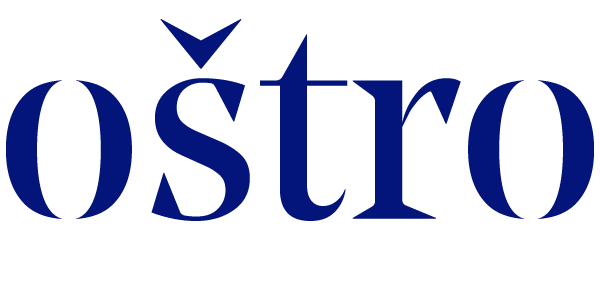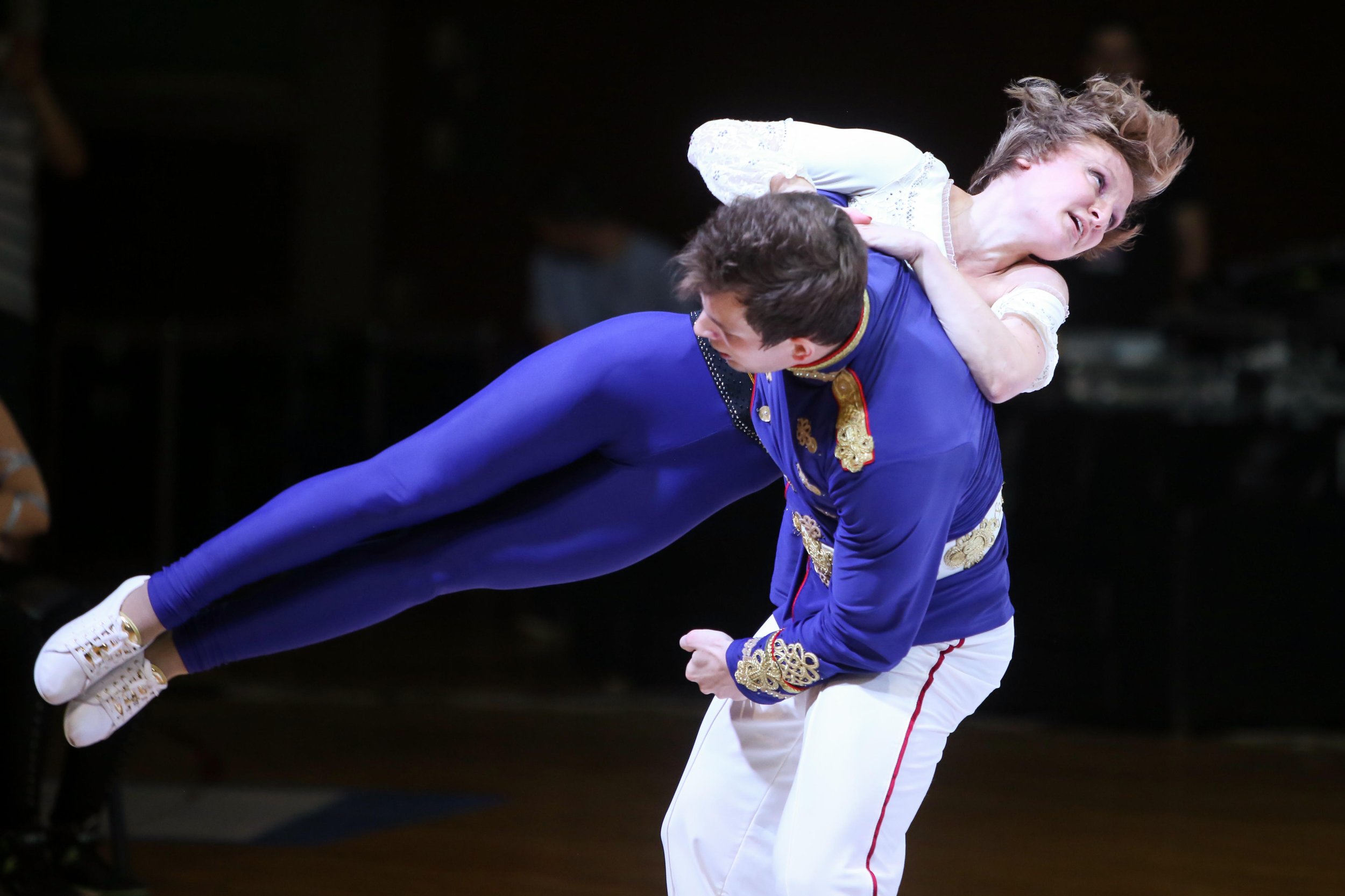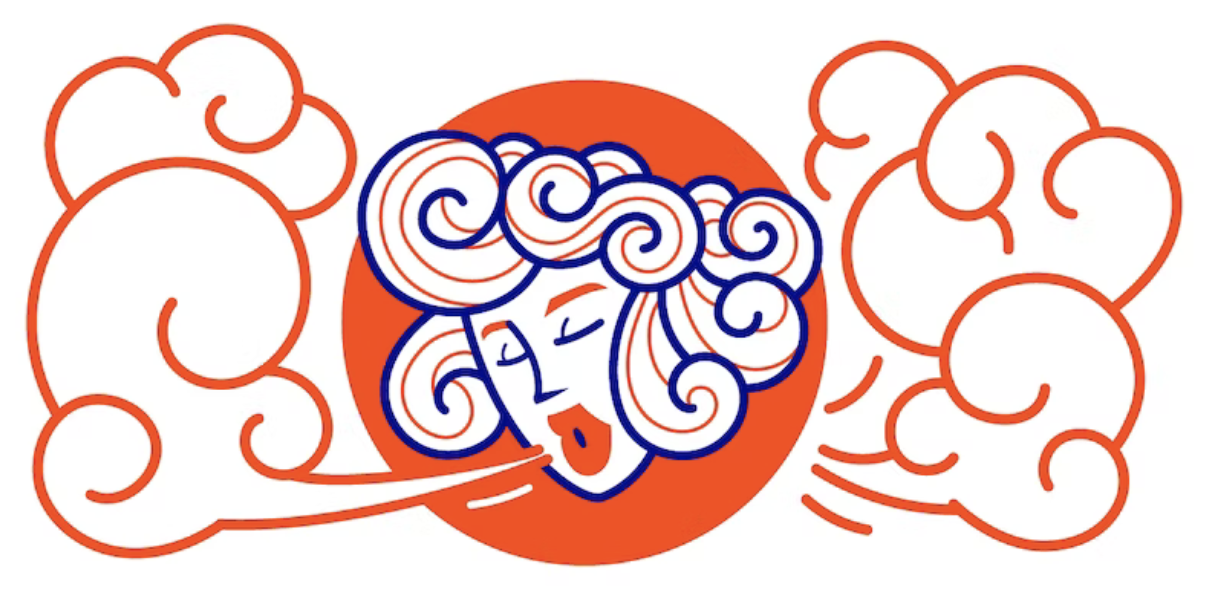Slovenian travels of Putin’s daughter
Anuška Delić
—
Katerina Tikhonova, one of the daughters of the Russian president, visited Slovenia at least five times between 2014 and 2019. Even though the visit was not by a foreign leader but by his daughter, the authorities should have been notified of visits by Tikhonova in advance. It is not clear, if they were.
Katerina Vladimirovna Tikhonova with her then dance partner Dmitry Alekseev in the semi-final of the Rock’n’roll World Championship in Zagreb in 2016. Photo: Goran Jakuš/Alamy Stock Photo
Katerina Tikhonova, the daughter of Russian President Vladimir Putin, is a scientist and dancer of acrobatic rock’n’roll. In 2014 she became vice-president of the World Rock’n’Roll Confederation (WRRC) in charge of marketing and expansion.
Even though WRRC’s president told Oštro that she no longer had any role in the organization since 2018, Tikhonova did not completely withdraw from the organization. When the confederation’s presidium held a meeting in Ljubljana in September 2019, Tikhonova attended as a guest to report on one of the items on the agenda.
She presented the idea for a “Corporate Clubs” project that would be financed by companies via the confederation and would over time evolve into independent sports centres. She informed the members of the presidium that preliminary agreements with three companies had already been signed.
All these companies were directly or indirectly connected with the Russian state: Gazprombank, Rusatom International Network and Rosneft Deutschland. The agreements with the first two were signed by fall of 2021. But the project stalled, at the latest when the final phase of Russia’s aggression against Ukraine began.
At the end of February 2022, the executive board of the International Olympic Committee officially proposed a ban on the participation of Russian athletes at competitions and cancellation of confirmed competitions in Russia. The same day, the WRRC decided to ban athletes from participating in competitions and to cancel those in Russia and find new hosts. It also decided that Russian companies and others are prohibited from sponsoring and supporting international competitions, associations, clubs and athletes.
The introductory phase of the war in Ukraine started in February 2014, when Russia occupied the Crimean Peninsula. A month later Tikhonova visited Slovenia. She stayed at the Hotel Slon in Ljubljana along with a few other guests – and her bodyguard Alexey Skripchak.
Documents shared with Oštro by the Russian non-profit media outlet iStories show that she was in Slovenia at least five times between 2014 and 2019.
Given that Tikhonova is the daughter of one of the most high-profile politicians in the world, her visits should have been announced to the Slovenian authorities, says security expert Andrej Rupnik. Oštro has not been able to independently verify, if that happened in this case. The Slovenian Security and Intelligence Agency (SOVA) does not comment on such matters.
Slovenia in the heart
The Russian non-profit investigative reporting center iStories shared with Oštro documents obtained from an email account of Tikhonova’s bodyguard Alexey Skripchak, which it has received anonymously. According to the OCCRP and the German Der Spiegel, which wrote about their travels this summer, Skripchak is a member of the FSO, the state security service.
Katerina Vladimirovna Tikhonova is a 36-year-old scientist and deputy director of the Institute for Mathematical Research of Complex Systems at Moscow State University. It was revealed by Reuters in 2015 that she does not use her father’s last name.
Putin in 2002 in Primorsky region in the Russian Far East with his two daughters and his wife at the time. Photo: kremlin.ru
That Tikhonova is the daughter of Vladimir Putin was confirmed for the media by Andrey Akimov who was at the time vice-president of Gazprombank. He later denied that, but Reuters managed to confirm this information again in 2017 – via a member of the WRCC presidium.
Today Tikhonova is on the list of persons sanctioned by the US and other countries.
Some of the email messages shared with Oštro by iStories contained hotel bookings and information about flights, including to Slovenia. Oštro has managed to confirm five visits to Slovenia by Tikhonova, and it is possible there were more.
Most of the bookings we have been able to confirm coincide with dates on which the WRRC presidium held meetings in Ljubljana.
In 2014, when Tikhonova stayed at Hotel Slon in the last days of March, this was not the case: the presidium of the confederation was in session just over two weeks later.
One room for three nights was booked in her name and one in the name of her bodyguard, Alexey Skripchak. A third room was booked for two nights, likewise in Skripchak’s name. Given the size of the rooms, we assume that four persons at most stayed there.
The confederation’s presidium concluded at the Ljubljana meeting that it will appoint a commission for expansion and marketing with Tikhonova as its chair. She was also given the assignment to prepare sponsor packages, the minutes of the meeting reveal.
Another WRRC presidium meeting took place in Ljubljana in January 2015. The minutes confirm that she did attend the meeting but Oštro does not have information on Tikhonova’s accommodation at the time.
In 2016 Tikhonova is believed to have stayed in Ljubljana on three occasions, but Oštro was only able to confirm two visits.
Skripchak booked a room at City Hotel Ljubljana for four nights and a maximum of three persons for the first days of February. At that WRRC presidium meeting, Tikhonova presented progress in efforts to expand the membership. They set the goal of having member organizations on three continents in 2017 and that rock’n’roll and boogie-woogie would be developed in new member countries.
The presidium, Tikhonova included, also met in Ljubljana in October of the same year, minutes of the meeting show.
On 1 February 2017 Tikhonova’s father, Russian president Putin, paid a visit to the prime minister of neighbouring Hungary, Viktor Orbán. Putin’s daughter arrived in Ljubljana two days later.
During her visit three rooms that can accommodate up to eight adults and one child were booked at City Hotel Ljubljana. But the two rooms booked in Skripchak’s name were for one person, which is why we assume at least three persons stayed in the three rooms.
The hotel stay again coincided with a session of the WRRC presidium in Ljubljana. Together with her collaborator Maria Kalacheva, Tikhonova reported on the expansion project – the goals they had set had been achieved, the meeting minutes show. Competitors from five continents registered for the World Championship.
In March 2018 the general assembly of the confederation took place in Moscow. As vice-president for expansion and marketing Tikhonova delivered a report on activities executed in 2017. Then the presidium appointed her as a special adviser to the president who can participate on behalf of the organization in marketing and expansion activities that were already confirmed.
That was probably when her term as vice-president of the WRRC ended.
Corporate rock ‘n’ roll
This October, the president of WRRC, Mirjam Kerpan Izak, a Slovenian national, assured Oštro’s reporter in a brief interview that Tikhonova has not had a role in the confederation since 2018. But minutes of presidium meetings show that in 2019 she put to the members a proposal to introduce Corporate Clubs that would be financed by corporations.
In September 2019 the presidium was in session in Ljubljana. Tikhonova attended the meeting as a guest at item 4 on the agenda that concerned expansion and marketing, more precisely item 4.2 - Corporate Clubs Project.
She presented an idea that the All-Russian Federation of Dance Sport and Acrobatic Rock’n’Roll had successfully implemented in Russia. Companies would establish rock’n’roll clubs and – via the WRRC – finance the salaries of coaches, gym rental and travel costs for the organization of corporate competitions. The clubs, named after the financiers, would gradually evolve into independent sports organizations.
Tikhonova also informed the presidium of preliminary agreements with three companies:
● Gazprombank, which had been sanctioned by the US in 2014 due to Russia’s aggression in Ukraine,
● Rusatom International Network, which represents the Russian state nuclear energy company Rosatom abroad,
● The German subsidiary of the oil company Rosneft where the Russian state’s direct stake in 2020 was in excess of 50% and which the US likewise sanctioned in 2014.
She announced that the agreements would be signed by the end of 2019. The presidium agreed that the Corporate Clubs project commences and entrusted it to Tikhonova and Kalacheva.
“On 1 February 2017 Tikhonova’s father, Russian President Putin, paid a visit to the prime minister of neighbouring Hungary, Viktor Orbán. Putin’s daughter arrived in Ljubljana two days later.”
In 2020 only Kalacheva, the new vice-president for expansion and marketing, reported on the project, according to minutes of meetings.
She notified the presidency that the German refinery PCK, which was majority owned by Rosneft, had already agreed to participate. It is unclear whether the WRRC actually signed an agreement with the company or not.
In September 2021 Kalacheva reported to the presidium that the WRRC had signed an agreement with Rusatom to open clubs in Armenia, Belarus, Turkey, Finland and Hungary. They could not start the project because of the Covid-19 pandemic measures, but she was hoping the first steps would be taken by the end of the year.
By that time a sponsorship agreement had been concluded with Gazprombank as well. It was agreed that it would contribute 30,000 euros and additional financial support to the development of a club in China.
Yet, Tikhonova’s father, Russian President Putin, launched the ongoing military aggression against Ukraine on 24 February 2022. International organizations, states and media responded and the lists of sanctioned individuals and companies worldwide proliferated.
During those early days of the aggression the International Olympic Committee spoke up three times. It sharply condemned Russia for violating the Olympic truce that had been confirmed by the United Nations in 2021 for the duration of the Olympic Games in Beijing. The truce should have started a week prior to the Olympics, on 4 February, and end a week after the completion of the Paralympic Games that followed.
Russia struck Ukraine after the end of the Olympics but prior to the start of the Paralympics.
The International Olympic Committee eventually proposed that sports organizations ban Russian athletes from competition and cancel or postpone already confirmed sports events in Russia.
The WRRC did the same. This is confirmed by the minutes of a presidium meeting held on February this year, where Kalacheva participated too. The presidency also extended the ban to funding competitions, clubs and athletes by Russian companies. It appears that soon after this decision, the presidium started bidding their Russian colleagues farewell.
If not before, the agreements with Gazprombank and Rusatom were terminated at this time. When exactly remains unclear. When Oštro’s reporter laid out to WRRC president Mirjam Kerpan Izak facts showing that Tikhonova was active in the organization beyond 2018, the year after which she alleged Tikhonova had no longer played a role, Kerpan Izak reiterated that Tikhonova had not played a role since then. She added that the organization had not had contact with her for several years.
Kerpan Izak said that the corporate clubs project had never taken off, but this is all she wanted to say. She requested that we stop asking her questions.
Tikhonova and Skripchak have not returned Oštro’s requests for comment.
Gregor Jamnik, the director of Hotel Slon and City Hotel in Ljubljana, could not provide answers to questions about accommodation for Tikhonova and Skripchak since hoteliers are “committed to confidentiality, which is why we do not reveal information about our guests”.
“Should anything happen to such a person in Slovenia, for example, the government would be in a very difficult position since it would not even have known that the daughter of a leader of such high profile as Putin was staying in the country.”
(Un)informing SOVA
Security and intelligence services worldwide have different rules and practices concerning when it comes to tracking children or close family members of politically exposed persons.
Andrej Rupnik, an expert on security and formed director of SOVA, told Oštro that announcing such visits ahead of time was a courtesy extended to the country where the closest family members of political leaders travel.
This is because visits that are not announced could be construed by the host country as unfair, as unfriendly. Should anything happen to such a person in Slovenia, for example, the government would be in a very difficult position since it would not even have known that the daughter of a leader of such high profile as Putin was staying in the country.
He explained that while he was at the helm of SOVA, the agency for example notified Croatia when he went there for vacation.
Oštro also asked Rupnik about entering the country with weapons given that Tikhonova traveled with a bodyguard who may have been armed. He said the procedure depends on the type of security guard.
If the guard is an employee of the state, the sending country notifies the receiving country who will enter, when, and with what kind of weapons. If it is a private security guard on a flight, the procedure is carried out by the departing airport.
SOVA has not answered Oštro’s questions about Tikhonova’s visits saying they do not comment on issues that concern article 2 of the act which governs SOVA.
Article 2 states that the agency collects and evaluates data, and provides information “from abroad relevant to safeguarding the security, political and economic interests of the state,” and on organizations, groups and persons that could constitute a threat to national security and constitutional order via their activities abroad.
Be Our Wind!
We wish to create a community together with you. Join us.
What do you gain by joining us? We have created three membership programs.



